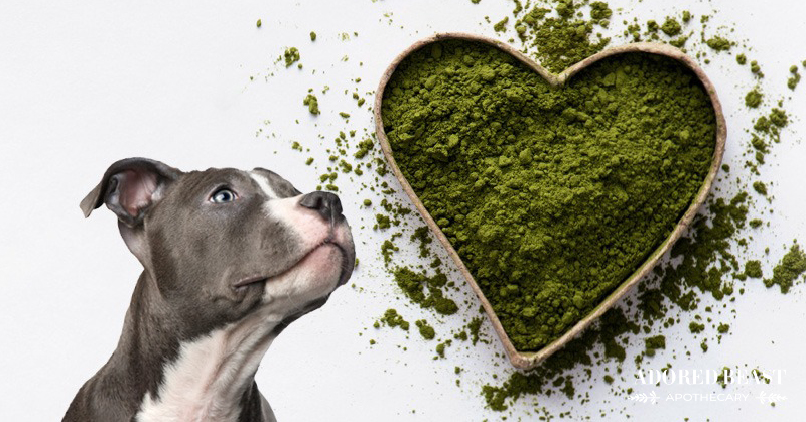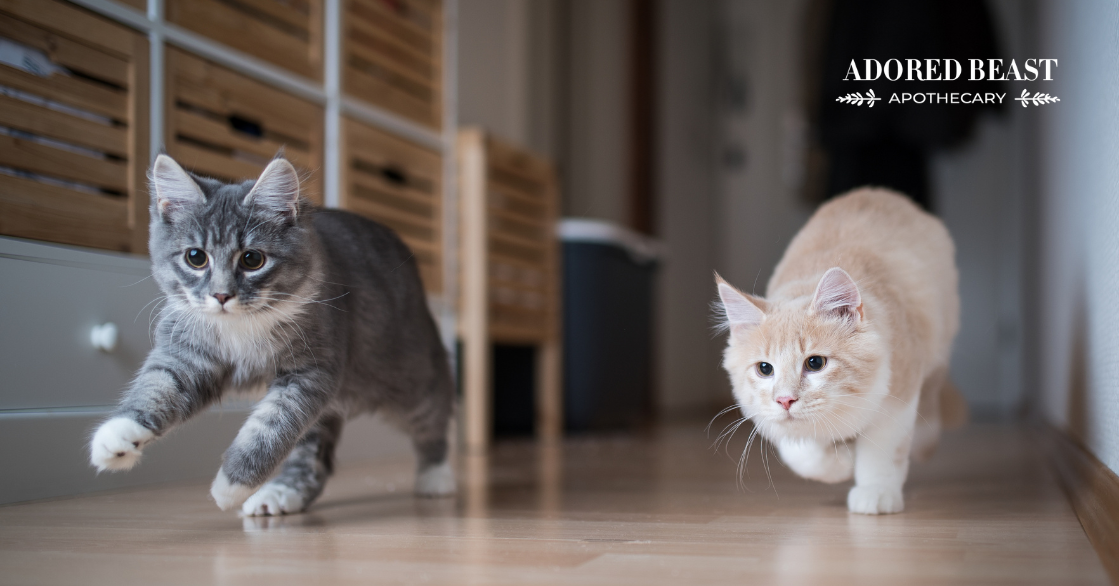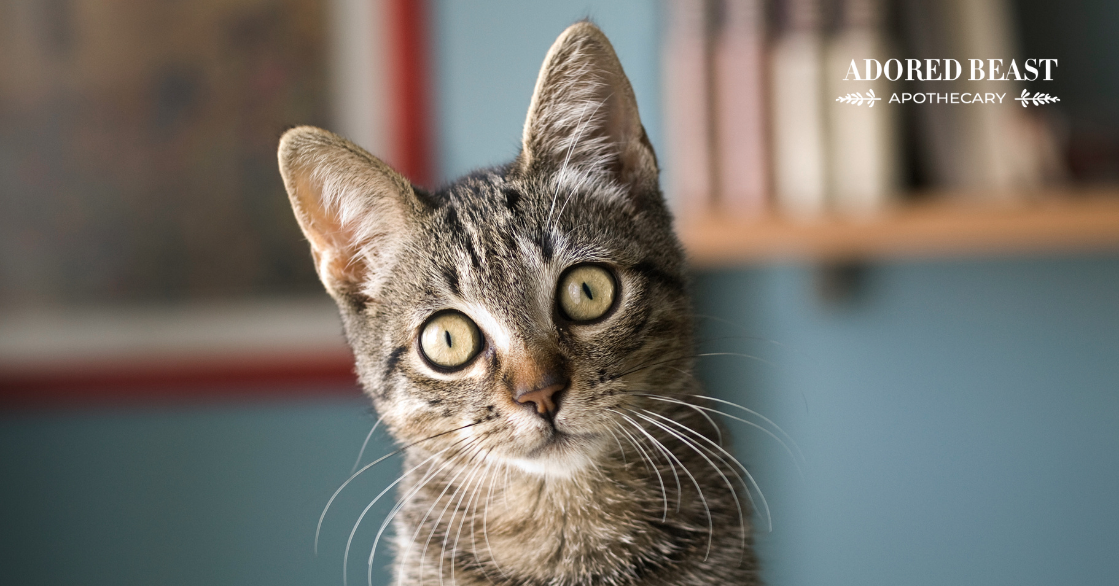Is your countertop is full of vitamins, minerals, herbs and oils, but your dog is still itchy, limping or just not in peak health? I have so many people come to me with this complaint, asking for help.
The problem, it seems, is that we’re so caught up in following guidelines created out of the need to avoid deficiency in times of war and scarcity, that our modern day mantra has become “bigger is better, more is better.” Yet now, thankfully, we have an abundance of real whole food in North America, and our bodies have the innate intelligence to know just how to use them. So why aren’t we listening to them?
And what is really disappointing is that we are falling for the fast food marketing concept of supersizing our natural health products. Why? Because we’ve forgotten that nature created our bodies in a way that allows them to make smart decisions, all on their own. We’re missing the point of synergy. Smaller amounts create an entirety instead of the smoke and mirrors idea that bigger is better.
One of my absolute favorite examples of this is phytoplankton. It is probably one of the most fascinating products I’ve ever used for my animals. It’s a perfect example of “less is more.”
Some people will have a hard time wrapping their heads around the power behind phytoplankton because the body needs such a small amount: one-sixteenth of a teaspoon!
Sounds crazy, I know, but it’s not. Here’s the scoop on how it can help your adored beasts.
Phyto-what?
Phytoplankton is a microscopic single cell organism that lives in the environment of water, both salty and fresh. It’s a complete single cell organism.
What does that mean? Well, think of a body having many different components like cells, blood, water: all of the aspects that make up a complete body. Every microscopic single cell organism of phytoplankton is like a complete body. Therefore every tiny cell that is absorbed contains all the complete nutritional components within it.
Phytoplankton has been able to provide the entire food source for the ocean for thousands of years. It’s so abundantly full of every complete component of nutrition that estimates suggest it puts out 50 – 90% of the Earth’s oxygen!
I love the fact that you can’t compare this little guy with any other supplement, because you don’t approach it as having X amount of milligrams of this vitamin or that mineral. It doesn’t follow the AAFCO standards or the human recommended nutritional profile. This is because it is not fractionated or standardized or mixed with other whole foods to make it complete. It is a complete entity in its own right.
And the coolest thing of all is that it’s at the bottom of the food chain. This means that when your animal ingests this tiny bit of awesomeness you get the REAL DEAL. You don’t lose the nutrition like you do when you eat fish or any other sea creature that eats phytoplankton (which, by the way, is all sea creatures). Phytoplankton has a complete nutritional profile, but some of that is lost when it is eaten by bigger sea creatures. The more you can eat that supplies nutrition lower on the food chain, the healthier that food is!
🐟 Did you know? Because fish aren’t able to produce EPA and DHA, they get it by consuming phytoplankton. Thus, these micro-algae are the nutritional source of omega-3 fatty acids found in fish.
Benefits of Phytoplankton for Dogs, Cats, Horses, and Us
These are just a few of the reasons I think phytoplankton is so valuable for our animals.
1. Complete Nutrition
Phytoplankton supplies complete nutrition with trace minerals, chlorophyll, essential amino acids, EPA, protein, carotenoids, vitamins, and the powerful antioxidant SOD (superoxide dismutase), all on its own! It’s a natural superfood.
Superfoods have been around for decades but there are still unfilled gaps in nutritional needs. The complete nutrition within phytoplankton is absorbed and resonates with the synergistic ways of the body beyond other superfoods. If anything, pure marine phytoplankton deserves its own classification entirely.
Together, these may have significant beneficial impacts on your animal’s health, including:
- Improved skin health
- Defends against oxidative stress
- Reduced allergies
- Better mobility and joint health
- Improved cellular function leading to healthier organs (e.g. liver, thyroid)
- Decreased inflammation
- Improved digestion
- Increased energy and stamina
- Decreased hyperactivity and anxiety
- Detoxification
2. Powerhouse Antioxidant
Now, what about free radicals that are responsible for oxidative stress? We often refer to this as “biological rusting,” an effect caused by too much oxygen in the body’s tissues. Not only do free radicals come from pollution and toxins, the body also produces them through exercise and from inflammation anywhere in the body.
This oxidative stress leads to an increased risk of negative health outcomes, such as cardiovascular disease and certain types of cancer.
Antioxidants are molecules that fight those harmful free radicals in your body. No individual is without free radical damage, so the more antioxidant protection, the healthier the cells will be. Superoxide dismutase within the cell of phytoplankton has been referred to as the “king of antioxidants.” No wonder some sea turtles that consume 90% of their diet from certain strains of phytoplankton can live until they are 200 – no rust on those guys 🙂
3. Amino Acids
One of the many reasons phytoplankton is so amazing is its amino acid profile.
All animals, including humans, are depleted in amino acids. We’re so inundated with information on fatty acids, vitamins, and minerals that we’ve totally forgotten about the one thing that supports all metabolic function (thyroid, muscle, energy and hormones): amino acids. Just think of thyroid disease, or the hormone loss through spay and neuter. Nothing is a coincidence; dogs and cats need this important part of the entire synergistic puzzle.
4. Bioavailability
Phytoplankton’s bioavailability (the rate at which the body absorbs something) is remarkable. It’s smaller than a red blood cell. This means that phytoplankton can directly nourish mitochondria, the energy-making factory for the cell’s engine.
This is huge for me because of my strong understanding of leaky gut syndrome, where even the most beneficial healthy whole foods slip past the gut lining into the bloodstream. Because they are undigested, they cause inflammation instead of what they’re supposed to do, which is decrease inflammation and supply nutrition. The cell size of phytoplankton is so small it acts like it’s digested, therefore it’s absorbed unlike any other whole food nutrition or supplementation.
How to Choose the Best Phytoplankton for Dogs (& everyone else)
Sadly, not all phytoplankton is equal.
Something to be aware of when looking for phytoplankton or any food or supplement from the ocean is the very real concern of mercury… This includes radiation that has entered the Pacific because of Fukushima, run-off of agricultural fertilizers, pesticides and man-made pollutants including chemicals, detergents, oil, plastics, drug residues, and sewage.
Among some of the many concerns regarding the cleanliness and purity of our oceans, as well as freshwater sources, we are now aware of Cyanobacteria such as spirulina and other green and red algaes which have the ability to produce Microcystins and BMAA (beta-N-methylamino-L-alanine). Microcystins primarily affect the liver causing minor to widespread damage, while BMAA is a Cyanobacterial neurotoxin that has been implicated in the development of Parkinson’s Disease, Alzheimer’s Disease, and Amyotrophic Lateral Sclerosis (ALS) and other Neurodegenerative diseases.
Equally, the once pristine freshwater lakes that have been growing spirulina, chlorella and blue-green algae are now vulnerable to toxic acid rain from fossil fuels and industrial combustion that emits nitrogen oxides (NOx) and sulfur dioxide (SO2).
These can significantly reduce the benefits of the phytoplankton, which renders it subpar. And, it could actually harm, rather than help, your adored beast.
When choosing a phytoplankton supplement, the product you buy should be:
- Sustainably grown and in no way detrimental to our oceans or planet
- Grown on land with sunlight
- Free of any radiation, heavy metals or toxins
- Non-GMO and vegan
- Without fillers of any kind including water or alcohol
The Truth About Tiny Doses
Pure phytoplankton is so concentrated that the daily dose for any animal is less than 1/16 tsp. If it’s pure, this dose should contain 250 billion complete phytoplankton nutritional cells.
Don’t let the small size fool you; be wary of anything that comes in a large bottle or in capsules because that likely means it has fillers. Ask questions from the company to be sure of the amount of cells you are purchasing.
I’ve had remarkable success with phytoplankton for dogs, cats, horses, and myself! If you’re looking for a simple way to incorporate a powerhouse of nutrition, this little guy has more to offer than any other single superfood I know.











![[RESEARCH] Is Herbicide Safe for Dogs?](https://blog.adoredbeast.com/wp-content/uploads/2025/06/herbicides-safe-for-dogs-103x55.png)
